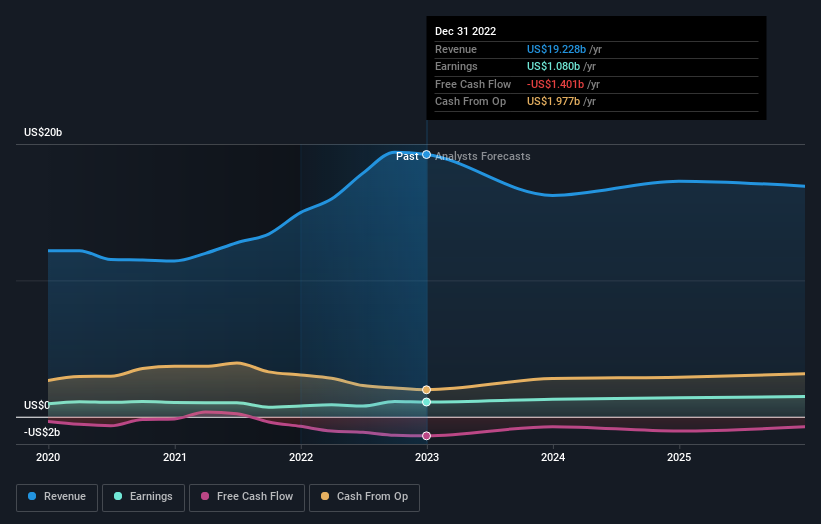Recent uptick might appease DTE Energy Company (NYSE:DTE) institutional owners after losing 15% over the past year
Key Insights
Given the large stake in the stock by institutions, DTE Energy's stock price might be vulnerable to their trading decisions
The top 18 shareholders own 50% of the company
Analyst forecasts along with ownership data serve to give a strong idea about prospects for a business
To get a sense of who is truly in control of DTE Energy Company (NYSE:DTE), it is important to understand the ownership structure of the business. With 75% stake, institutions possess the maximum shares in the company. Put another way, the group faces the maximum upside potential (or downside risk).
After a year of 15% losses, last week’s 5.9% gain would be welcomed by institutional investors as a likely sign that returns might start trending higher.
In the chart below, we zoom in on the different ownership groups of DTE Energy.
View our latest analysis for DTE Energy
What Does The Institutional Ownership Tell Us About DTE Energy?
Institutional investors commonly compare their own returns to the returns of a commonly followed index. So they generally do consider buying larger companies that are included in the relevant benchmark index.
As you can see, institutional investors have a fair amount of stake in DTE Energy. This implies the analysts working for those institutions have looked at the stock and they like it. But just like anyone else, they could be wrong. If multiple institutions change their view on a stock at the same time, you could see the share price drop fast. It's therefore worth looking at DTE Energy's earnings history below. Of course, the future is what really matters.
Since institutional investors own more than half the issued stock, the board will likely have to pay attention to their preferences. We note that hedge funds don't have a meaningful investment in DTE Energy. The company's largest shareholder is The Vanguard Group, Inc., with ownership of 11%. In comparison, the second and third largest shareholders hold about 9.6% and 9.2% of the stock.
A closer look at our ownership figures suggests that the top 18 shareholders have a combined ownership of 50% implying that no single shareholder has a majority.
Researching institutional ownership is a good way to gauge and filter a stock's expected performance. The same can be achieved by studying analyst sentiments. There are a reasonable number of analysts covering the stock, so it might be useful to find out their aggregate view on the future.
Insider Ownership Of DTE Energy
The definition of an insider can differ slightly between different countries, but members of the board of directors always count. The company management answer to the board and the latter should represent the interests of shareholders. Notably, sometimes top-level managers are on the board themselves.
Most consider insider ownership a positive because it can indicate the board is well aligned with other shareholders. However, on some occasions too much power is concentrated within this group.
Our most recent data indicates that insiders own less than 1% of DTE Energy Company. It is a very large company, so it would be surprising to see insiders own a large proportion of the company. Though their holding amounts to less than 1%, we can see that board members collectively own US$158m worth of shares (at current prices). In this sort of situation, it can be more interesting to see if those insiders have been buying or selling.
General Public Ownership
The general public-- including retail investors -- own 25% stake in the company, and hence can't easily be ignored. While this group can't necessarily call the shots, it can certainly have a real influence on how the company is run.
Next Steps:
It's always worth thinking about the different groups who own shares in a company. But to understand DTE Energy better, we need to consider many other factors. Take risks for example - DTE Energy has 3 warning signs (and 1 which is concerning) we think you should know about.
If you would prefer discover what analysts are predicting in terms of future growth, do not miss this free report on analyst forecasts.
NB: Figures in this article are calculated using data from the last twelve months, which refer to the 12-month period ending on the last date of the month the financial statement is dated. This may not be consistent with full year annual report figures.
Have feedback on this article? Concerned about the content? Get in touch with us directly. Alternatively, email editorial-team (at) simplywallst.com.
This article by Simply Wall St is general in nature. We provide commentary based on historical data and analyst forecasts only using an unbiased methodology and our articles are not intended to be financial advice. It does not constitute a recommendation to buy or sell any stock, and does not take account of your objectives, or your financial situation. We aim to bring you long-term focused analysis driven by fundamental data. Note that our analysis may not factor in the latest price-sensitive company announcements or qualitative material. Simply Wall St has no position in any stocks mentioned.
Join A Paid User Research Session
You’ll receive a US$30 Amazon Gift card for 1 hour of your time while helping us build better investing tools for the individual investors like yourself. Sign up here

 Yahoo Finance
Yahoo Finance 

